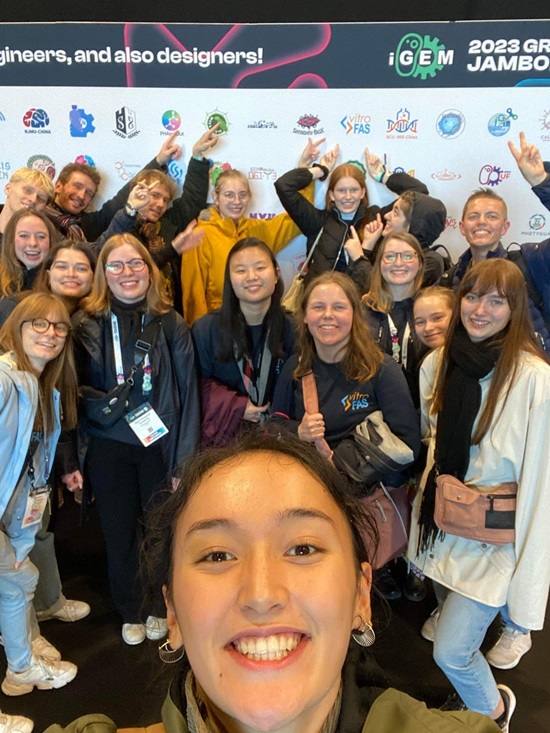
SDU students win gold medal and Best Integrated Human Practices at iGEM 2023
A group of students from the Faculty of Engineering and the Faculty of Science at the University of Southern Denmark (SDU) achieved a remarkable feat at the iGEM 2023 competition, clinching the gold medal as well as Best Integrated Human Practices.
Twelve students from SDU have recently won the gold medal and Best Integrated Human Practices at the iGEM 2023 competition in Paris earlier this month.
The team, known as vitroFAS, demonstrated excellence in their project and received nominations in multiple categories, including Best Bioremediation project, Best Sustainable Development Impact, and Best Presentation.
– We are thrilled to have won the Best Integrated Human Practices special prize! We put much effort into developing our solution in cooperation with companies and waterworks. The waterworks need our solution, so it makes great sense to consult with them. Because of this collaboration, we changed our ideas many times as we gained knowledge and feedback. This work assures that our solution is realistic, which is super important to bring our solution into the real world. It was great to be acknowledged by the judges - they could see how much work was put into this, says the team in a joint comment.
– But before going to Paris, we all just hoped for a nomination - and we got three! Also, nominations for prizes were significant to us.
Addressing a global challenge: PFAS contamination
The project was undertaken by the SDU team, vitroFAS, which centres around tackling the pervasive issue of per- and poly-fluoroalkyl substances (PFAS) contamination in water sources worldwide. PFAS, commonly called 'forever chemicals', have been extensively used in various products since the 1950s, leading to widespread water contamination, soil, and human bodies.
The consequences of PFAS exposure include serious health hazards such as thyroid disease, increased cholesterol levels, reduced liver function and an elevated risk of certain cancers. Moreover, PFAS persist in nature for extended periods, posing a threat to future generations.
Innovative solution: vitroZymes for PFAS degradation
In response to this global challenge, the SDU team developed vitroZymes, optimized dehalogenases designed to efficiently degrade PFAS, explicitly focusing on Perfluorooctanoic acid (PFOA). The team utilized advanced technology, including error-prone PCR, to enhance the effectiveness of these enzymes.
– Our goal is not only to treat the symptoms but also to create awareness and encourage a shift in the production and consumption practices related to PFAS-containing products, states Annabell Hannibalsen, studying Civil Engineering in Physics and Technology.
Alignment with Sustainable Development Goals
vitroFAS' demonstrated a solid commitment to sustainability by aligning its efforts with the United Nations Sustainable Development Goals (SDGs). Their project directly contributes to Goal 3 (Good Health and Well-Being), Goal 6 (Clean Water and Sanitation), Goal 12 (Responsible Consumption and Production), and Goal 14 (Life Below Water).Recognition and future impact
The team's efforts were acknowledged with the prestigious gold medal and Best Integrated Human Practices, recognizing their outstanding engagement with the broader societal implications of their project. Additionally, their project received category nominations emphasizing its potential bioremediation impact, sustainable development alignment and effective presentation.
– Our goal is not just about winning awards but creating a lasting impact on the environment and human health, emphasizes Annabel Hannibalsen.
– PFAS is polluting nature and tainting our drinking water, thereby accumulating in humans and causing several diseases. Our ultimate goal at vitroFAS is to completely degrade all types of PFAS and thereby rid the world of PFAS. Working on this project for almost nine months has brought us closer to reaching our goal, but there is a long way to go to fulfil it completely. However, we have built the foundation for future iGEM teams and scientists to continue working on finding the solution.

Looking ahead: A sustainable future
As vitroFAS looks towards the future, they aim to integrate their vitroZymes into existing water treatment systems to efficiently and sustainably remove PFAS, preventing human ingestion and environmental pollution.
For more information about vitroFAS and their groundbreaking project, please visit the project website.
About iGEM
The iGEM (International Genetically Engineered Machine) competition is an annual event that brings together students from around the world to showcase their innovative projects in synthetic biology. It encourages collaboration, creativity and the application of biological engineering to address global challenges.
– iGEM isn't just a great opportunity but a life changer. You are met with many inspiring people who will do anything to see you succeed. We, as a team, showed that it is possible to use your whole summer to achieve amazing things with the power of synthetic biology. And as iGEM's motto is: Once an iGEM'er, always an iGEM'er.
– Along our journey, we have gathered a lot of contacts, which also can help future iGEM'ers. We can provide our knowledge since we also want to see them succeed as much as we did, and who knows... Maybe grow even more.
– Also, we hope that future iGEM teams will take up our project from where we left off, just as a former team inspired us. That encapsulates the beauty of iGEM: everything is open for the public and, therefore, for new iGEM teams to build upon the work already done. There are still some challenges regarding our project, but now there are fewer than when we started, and this development will continue as long as iGEM exists.
The 2023 SDU iGEM initiative and the team vitroFAS were financially supported by the Department of Green Technology (IGT), the Department of Biochemistry and Molecular Biology (BMB), the Faculty of Science (NAT), and the Novo Nordisk Foundation (grant nr NNF23SA0084065).